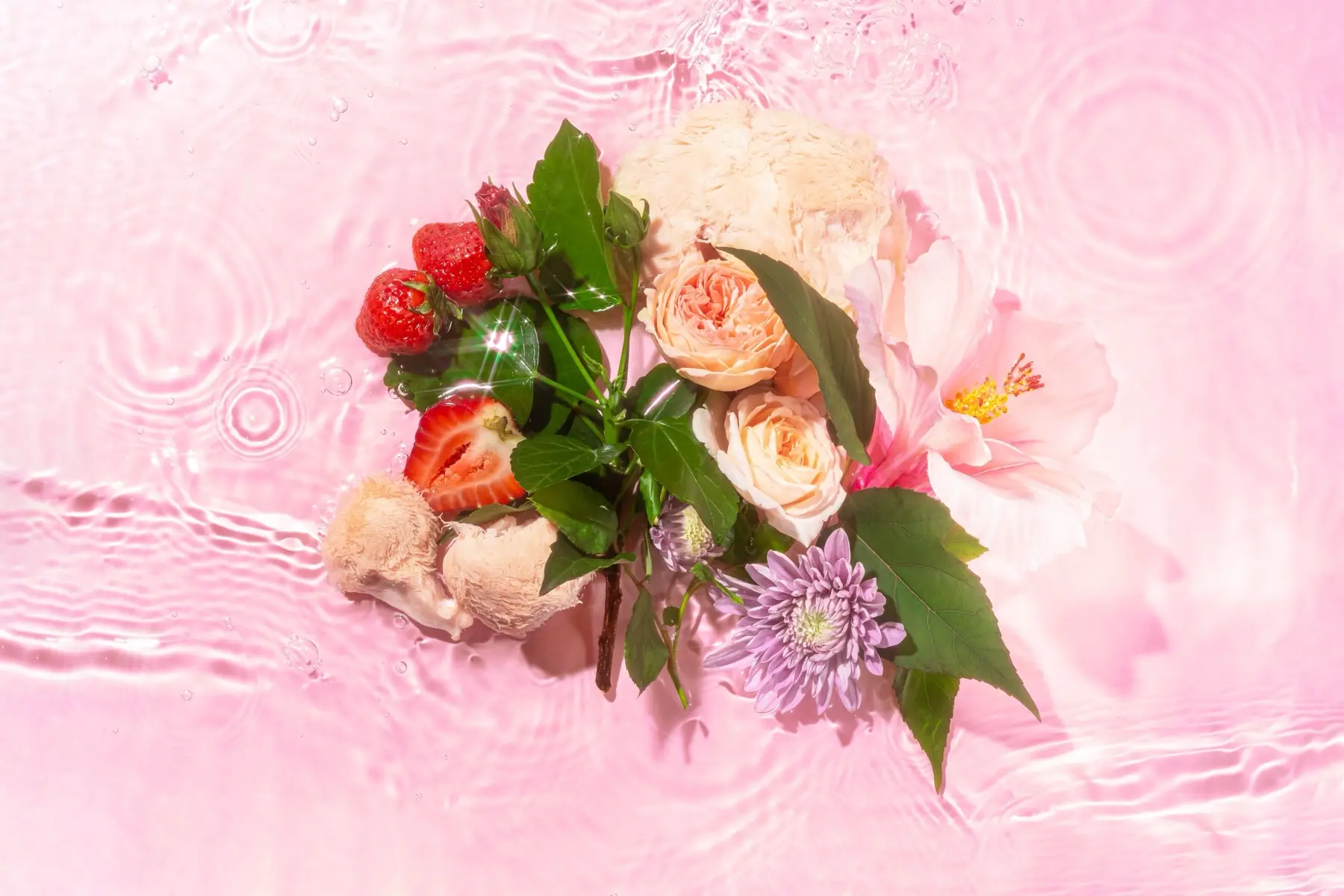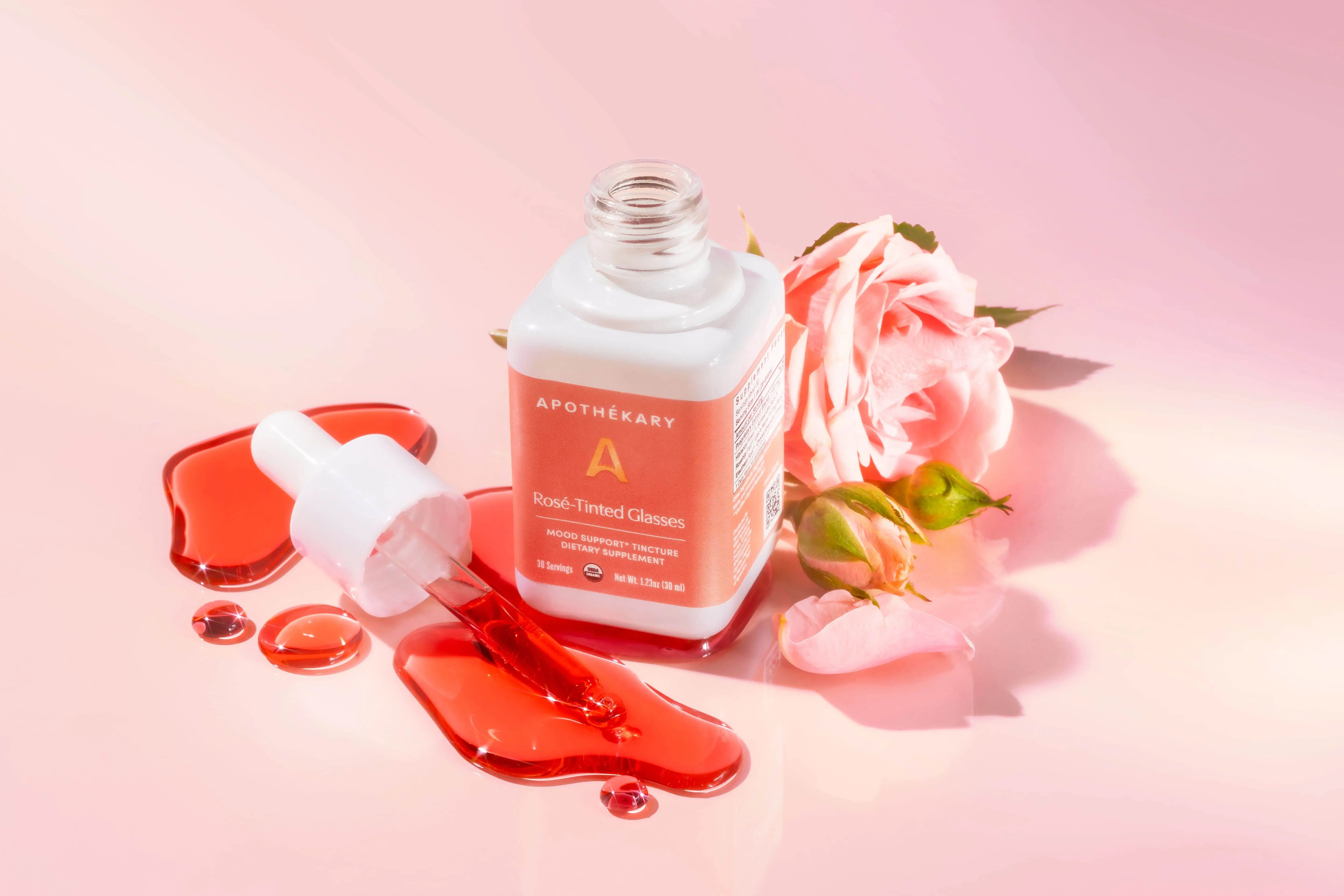Join me in welcoming the newest edition to our certified organic wine alternative collective, Rosé-Tinted Glasses™. Unlike Stop Your Wine-ing® and Take the Edge Off™ which contain calming nervine herbs to relax you in the middle or at the end of a long day, this alcohol-free tincture was formulated to uplift, energize, and boost your mood. Our alcohol-free rosé alternative contains adaptogenic schisandra berry, Siberian ginseng, and lion’s mane to help balance our nervous systems over time and help us manage feelings of stress, fatigue, and overall vitality.
This is a daytime formula that supports overall cognition and energy levels—so you can be the life of the summer party, without the hangover. For those who love the classic rosé floral notes, this formula contains aromatic chrysanthemum flowers—one of the oldest plants in the Chinese medical literature traditionally used for supporting our "qi" or life force. Hibiscus, rosehips, and strawberries round out the formula to provide vital antioxidants and nutrients and give us that tart and fruity rosé vibe. Take a dropper or two at a summer party, at your desk for a sluggish mind, when stress has you feeling drained, or for a pick-me-up when traveling.
The herbs

Schisandra berry
(Schisandra chinensis)
Schisandra berry is a potent adaptogenic berry that has been utilized in traditional Chinese medicine (TCM) for centuries. In TCM, it is considered a tonic1 that helps to address fatigue and impairments of the lungs, heart, and kidney channels. It is a five-flavored berry containing notes of sour, bitter, pungent, salty, and sweet. Since schisandra is an adaptogen, it helps to regulate our body’s stress response and can help it to balance cortisol levels. A clinical study2 showed that when used in combination with Siberian ginseng (eleuthero), schisandra berry has cognition benefits that help support our reaction to stressful situations in as little as one serving.
In addition to supporting stress and energy levels over time, schisandra berry has been shown to support energy levels in the moment. The tart berries are also rich in antioxidants3, helping the body remove free radicals and lower signs of inflammation. In addition to its nervous system benefits, schisandra can be protective against photoaging4, often associated with UV skin damage, and can help improve skin moisture5 and tone–protecting our sun-kissed skin from the summer rays.
Lion’s mane mushroom
(Hericium erinaceus)
In the wild, lion’s mane grows on dead or dying hardwood trees, and unlike most mushrooms that grow close to the ground, it can be found high in the canopy. Lion’s mane has a unique look, as it’s mainly white in color with spines that hang down like icicles from its base. These spine-like teeth produce and release spores that allow the organism to reproduce.
Traditionally, lion’s mane was taken to nourish6 our five vital internal organs (lung, spleen, heart, liver, and kidney), assist digestion, and as an aid for general weakness and fatigue. But of all the medicinal mushrooms, lion’s mane has the most research to support its promotion of overall brain health7. It is known to support the growth and protection of nerve cells, making it beneficial for improving memory, reducing brain fog, and helping the body balance our stress responses. Its neurotrophic properties aid in supporting general cognitive health as well as improving cognitive impairment due to underlying neurological disorders8. It also has mood-elevating properties that make it a perfect fit for this formula. A 4-week clinical trial9 revealed its mood enhancement capabilities in menopausal women.
Siberian ginseng
(Eleutherococcus senticosus)
Siberian ginseng or eleuthero root is a well-studied adaptogenic herb native to Japan, Korea, China, and Eastern Russia. It has been utilized in traditional Chinese medicine as well as Korean and Russian folk medicine for thousands of years to support stamina and promote overall health. The root is considered an energizing adaptogen and has proven itself in many clinical studies. It was actually one of the first adaptogens ever studied clinically10 back in the 1950’s where it showed benefits for cognitive function and physical and mental endurance when compared to a placebo. It can be a beneficial herb for a pre-workout boost as studies11 have demonstrated its ability to increase stamina, oxygen utilization, and overall athletic performance.
The roots have active compounds such as polysaccharides, coumarins, and eleutherosides A, B, C, D, and E which all contribute to supporting a healthy immune system. Eleutheroside B and E, in particular, have been shown to improve memory and learning12. So whether you are looking to curb your stress response, decrease adrenal fatigue, increase workout stamina, or support immunity–Siberian ginseng can help.
Chrysanthemum flower
(Chrysanthemum morifolium)
Not often seen in Western herbal formulas, chrysanthemum flowers have been utilized in traditional Chinese and Ayurvedic medicine for centuries. It is often compared with the common chamomile in its uses and flavor profile–think floral and sweet, with bitter undertones. Like chamomile, chrysanthemum is a gentle nervine that supports digestion and liver health. Some of the oldest Chinese medical13 texts describe the plant’s ability to “lift the inhibition of blood and qi” or in words support the movement of blood and energy within the body. Other traditional uses14 include fatigue prevention, headaches, and eye health. Medicinal properties within the flowers can also be beneficial for managing obesity15 –though more studies are warranted.
Hibiscus
(Hibiscus sabdariffa)
Hibiscus is widely cultivated and consumed as a refreshing tea throughout the world. The vibrant red calyx16 (part of the hibiscus flower) holds most of the plant's medicinal properties, but the leaves, seeds, and flowers have also been utilized traditionally. Some historical uses of hibiscus include using it to lower internal body temperature, drinking the tea as a tonic17 for the heart, and as a remedy to ease cold and sore throat symptoms. Hibiscus research18 has shown its ability to block starch and sugar absorption–which can help aid the body in weight loss and blood sugar balance. In addition, it can help curb inflammatory effects19 and support healthy blood pressure over time.
Research has also pointed to its many potential and proven benefits for the skin. Like schisandra berry, the high vitamin C and antioxidant content20 in hibiscus can act as a healing agent for damaged skin through its ability to boost21 collagen synthesis activities can help prevent premature skin aging.
Rosehips
(Rosa canina)
Rosehips are the fruit of the rose plant that develop after the petals fall from the flowers. Like other berries, they are rich in vitamin C and flavonoids which have an array of health benefits. First, rosehips can help support the body's natural inflammatory response22 without the common side effects associated with over-the-counter solutions. Like many of the other herbs in this formula, rosehips also have incredible skin benefits. Intake of the berries can also help improve skin issues23 related to aging–such as the early onset of wrinkles and skin elasticity.
Strawberry
(Fragaria × ananassa)
Lastly, who doesn’t love a fresh summer strawberry? A small amount of strawberry has been added to the formula for its supreme flavor, juiciness, and berry-rich benefits. A collection of sixteen studies24 revealed that daily consumption of strawberries showed positive health benefits related to inflammation, blood sugar balancing, antioxidant status and so much more. Another recent study25 showed there specific cardiovascular benefits for supporting a healthy heart.
Conclusion
Reminiscent of your favorite rosé, the fruity non-alcoholic tincture features herbs that are a feast for the senses. The sweet, tart, fruity, and floral flavors taste incredible straight on the tongue or as a key ingredient in your choice mocktail. On the nose, you get fresh garden strawberries and the delicate citrus notes of hibiscus. The striking color is 100% natural plant extracts—featuring vitamin C and polyphenol-rich herbs that are naturally robust pink and red in hue. Do yourself a favor and try our alcohol-free rosé alternative at your next summer party—to leave yourself feeling even rosier the next day.
https://www.herbalgram.org/resources/herbalgram/issues/106/table-of-contents/hg106-herbpro-schisandra
https://pubmed.ncbi.nlm.nih.gov/16261511
https://www.mdpi.com/2076-3921/10/4/620
https://www.mdpi.com/2072-6643/11/2/333/htm
https://www.mdpi.com/2076-3921/10/4/620/htm
https://restorativemedicine.org/wp-content/uploads/2017/12/lions-mane.pdf
https://www.ncbi.nlm.nih.gov/pmc/articles/PMC6720269
https://www.mdpi.com/1422-0067/21/1/163/htm
https://restorativemedicine.org/wp-content/uploads/2017/12/lions-mane.pdf
https://pubmed.ncbi.nlm.nih.gov/34087398
https://restorativemedicine.org/journal/supporting-adrenal-function-with-adaptogenic-herbs
https://www.ncbi.nlm.nih.gov/pmc/articles/PMC4145894
https://encyclopedia.pub/entry/32494
http://herbalgram.org/resources/herbclip/issues/issue-699/chrysanthemum-extract-ischemic-stroke
https://pubmed.ncbi.nlm.nih.gov/32899992
https://www.herbalgram.org/resources/herbalgram/issues/74/table-of-contents/article3102
https://www.sciencedirect.com/science/article/pii/S030881461400692X
https://pubmed.ncbi.nlm.nih.gov/30626104
https://www.mdpi.com/1424-8247/15/4/464
https://www.sciencedirect.com/science/article/pii/S030881461400692X
https://www.hindawi.com/journals/bmri/2017/7932019
https://pubmed.ncbi.nlm.nih.gov/22762068
https://pubmed.ncbi.nlm.nih.gov/26604725
https://www.mdpi.com/2072-6643/11/7/1510
https://www.freshfruitportal.com/news/2023/02/27/strawberries-could-help-fight-heart-disease-study-says



